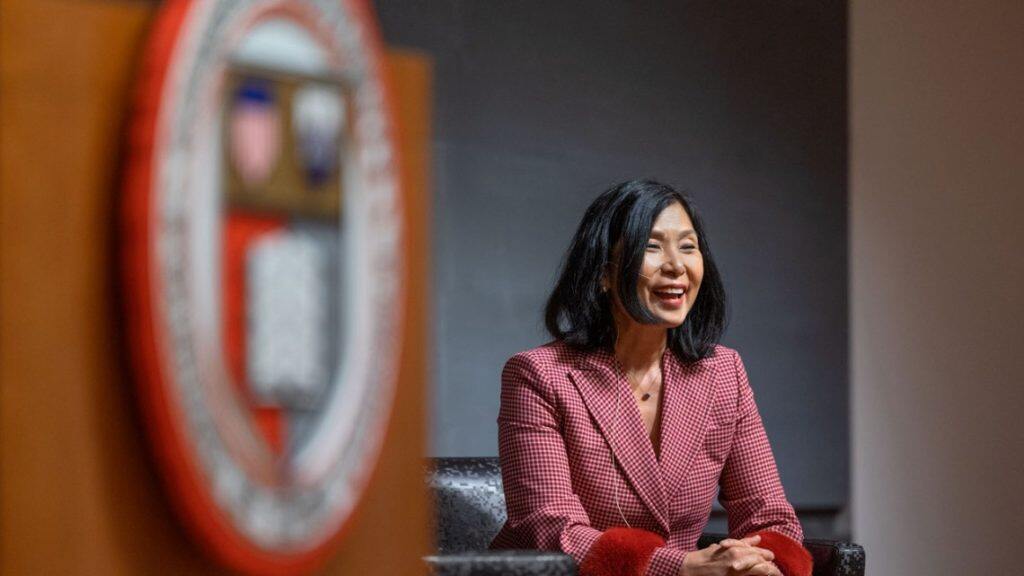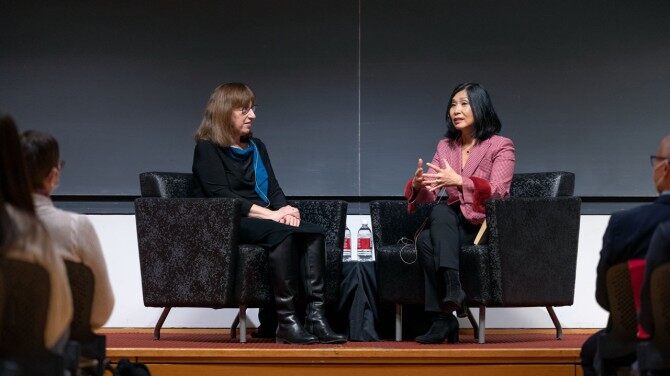Growing up Asian in apartheid South Africa, Angela Hwang, MBA ’94, wasn’t allowed to attend public school, take public transportation or attend college without government authorization.


Angela Hwang, MBA ’94, speaks March 9 as Cornell’s 39th Robert S. Hatfield Fellow in Economic Education.
But those inequities helped her achieve a successful career, including her current role as president of Pfizer Biopharmaceuticals Group, she said.
“When you think about the massive inequities I grew up in, I saw some people able to rise up above them – and others not,” Hwang said. “It was a really important lesson for me in terms of advocacy, equity, being a part of the solution, speaking up and uplifting others.”
Hwang spoke with President Martha E. Pollack March 9 at a virtual conversation as Cornell’s 39th Robert S. Hatfield Fellow in Economic Education.
She helped lead Pfizer to create the first COVID-19 vaccine and manages an organization of 26,000 employees in 125 countries.


Angela Hwang, MBA ’94, speaks with Cornell President Martha E. Pollack.
Despite the discrimination she faced, Hwang did go to college. She eventually left a successful, yet unfulfilling, microbiology research career in South Africa to pursue an MBA degree at Cornell.
That’s where she took an industrial policy class in 1993 and studied then-President Bill Clinton and Hillary Clinton’s controversial plan to rehaul the U.S. health care system. The course allowed her to analyze the policy proposals, critique them and provide alternatives – and ultimately changed the course of her life.
“I then realized what it was what I wanted to do, that brought together my past in science, my future in business – and that was health care,” she said.
Hwang advised current MBA students to follow their curiosity, as she did, and take classes in as many areas as possible.
“You don’t know where the business world is going to go,” she said. “You don’t know what the next breakthrough trend is, so you really want to be set up to have many arrows in your quiver. Who knew where my industrial policy class was actually going to lead me?”
Pollack asked what enabled Pfizer to react quickly and create the first COVID vaccine. Hwang cited the company’s partnership with the global scientific community and its culture of inclusion.
She and the leaders on her team discuss tough topics such as equity, unconscious bias and inclusion on a regular basis, which leads to more empathy between people with different backgrounds and a diversity of ideas, she said.
“Change doesn’t happen unless everyone is willing to look uncomfortable truths in the eye and have a discussion about it, because that’s when you can move forward and create understanding,” Hwang said. “That’s when you can create better solutions.”
The solution to COVID came in the form of a vaccine – which usually takes five to seven years to finalize, but the culture at Pfizer allowed them to move faster, she said. The vaccine work, titled “Project Lightspeed,” took only 248 days from start to submission to the Food and Drug Administration. Everyone on the project worked in parallel, instead of in sequence, to get to the finish line.
“Typically, in a normal process, you would get to one milestone, have a positive or negative outcome, and then move to the next,” Hwang said. “But clearly we didn’t have time for that. So we just said, ‘Everybody go, all at once.’”
In March 2021, Hwang visited one of Pfizer’s vaccine manufacturing sites in Kalamazoo, Michigan, and was moved by huge banners on every wall that read “Making the impossible, possible.”
“That was such an emotional moment for me because it was just the four words that captured everything there was to say about this miracle that happened,” Hwang said. “And it wasn’t just by chance, it was because … the will, the determination, the courage and people just not willing to give up.”
The Continental Group Foundation established the Robert S. Hatfield Fund for Economic Education at Cornell in 1980 to honor the then retiring chairman, president, and chief executive officer of the Continental Group Inc. The fund supports the Hatfield Fellows Program, which serves as a major platform for the exchange of ideas between the academic and the corporate communities.






































